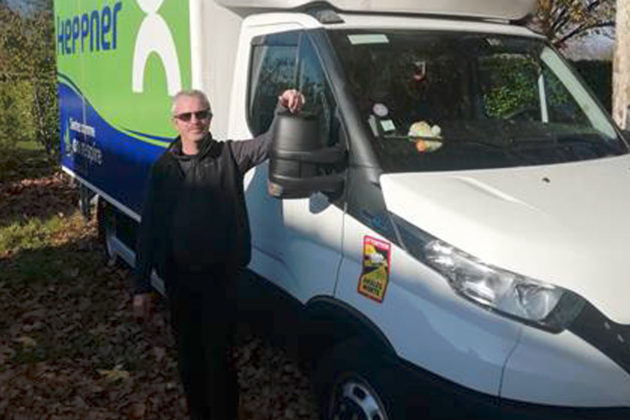
Christophe Carrillo

Can you tell us a little about your company? (date of formation, number of employees, number of vehicles, geographical reach, type of customers, special features)
My company is called Carrillo Christophe and it was formed on 23 May 2013. I have one 20-m3 vehicle and I work in Grenoble, and more specifically in the city centre, for both private customers and companies. I carry everything, from boxes to pallets, except for perishable goods, using different formulas, and particularly operating under priority delivery contracts.
Why do you work with Heppner? How long have you been working with us? What is your relationship based on?
I almost got involved with Heppner during my previous job. I have always wanted to set up my own business and work for myself, as I was already aware of the constraints related with management and administration tasks. I wanted to continue doing my job, but without these office-based aspects. When a friend of mine retired, I jumped at the opportunity and took over his route. Large companies are rarely willing to work with self-employed professionals and small companies. However, Heppner puts trust first in their business relationships and they agreed to work with me in June 2013.
I had worked with other industry players in the past and sometimes the feeling was a bit “factory-like”. But with Heppner, it’s different. There’s a genuine spirit of work quality and sharing. The human element is important and you feel that you are part of a family enterprise where dialogue is always possible. More than a subcontractor, I’m treated like a partner.
Are your customers aware of the transport industry’s environmental impact? And on this subject, does your involvement in Heppner’s energy transition project contribute added value to your company? How do you leverage this?
Many people still don’t realise that trucks are clean, but they are happy when they find out. For my part, it’s something I stress because I’m very proud of it! My customers are increasingly aware of the reduction in the transport industry’s environmental impact and that’s a real added value for me, particularly as I am now ahead of future regulatory obligations.
Could you have implemented this transition without Heppner? If you could have, how long would it have taken you?
By 2025, I would not have been able to drive the vehicle that I was still using for my work until just a few months ago. But after meeting with my contact people at Heppner, I decided to accelerate the process and switch to a natural gas vehicle (NGV). In retrospect, it was a very good decision. The fact that I didn’t wait until my back was against the wall before taking the plunge meant that I was able to sell my diesel vehicle quickly and at a good price and buy a new NGV just as quickly. A few years from now, the second-hand diesel market will be saturated and devalued. And people will have to wait months to get a new NGV…
Are you affected by low emission zones? Are the new environmental regulations for transport a threat or an opportunity for the industry?
I am the only company operating in the centre of Grenoble and most of the companies in my industry are operating in what is today a LEZ prefiguration.
This “low emission zone” has already been defined. The restriction is not effective as yet but there are a lot of information campaigns and they are being boosted with inspections aimed at educating the industry. The LEZ will become effective on 1 January 2025 and, after that date, access to the centre will be restricted. It is up to us to make this change an opportunity for the transport industry.
